- Home
- John Bellairs
The Mummy, the Will, and the Crypt Page 6
The Mummy, the Will, and the Crypt Read online
Page 6
Johnny was silent. Up until now he had not believed the strange young man's stories, but he was beginning to have second thoughts. Johnny looked down at the chrome-plated flashlight he held in his hands. It looked expensive. And there was the rifle lying there too. "Maybe you're right," he said slowly, "but... well, would he really have left this stuff just layin' here?"
Fergie shrugged. "Why not? He's rich as Croesus, so he can buy himself more rifles and flashlights, can't he? Besides, he's got a screw loose. Crazy people do crazy things."
Again Johnny was silent. It seemed to him that Fergie was being very reasonable and logical. All the same, he had his doubts. Finally, with a weary shrug, he said "Oh, okay! Let's go on back."
"Right," said Fergie, nodding. Then, on a sudden impulse, he tucked his flashlight under his armpit and cupped his hands to his mouth, "NIGHTY-NIGHT, CHAD BABY!" he yelled. There was no answer. But then, the boys didn't expect one.
Fergie and Johnny did not try to take the rifle back with them. They left it lying on the rain-soaked road and slogged on back to camp. At the flagpole they parted, and each one ran back to his own building. As he slipped in, closing the door softly behind him, Johnny noticed the clock in the downstairs hall. It said five minutes before two.
Johnny didn't get much sleep that night. He was still terribly keyed up, and he lay tossing and turning for a long time, until—around five a.m.—he dozed off, and had a dream about Mr. Glomus chasing him through an endless tunnel. And then, before he knew it, reveille was blowing again, and Johnny crawled out of bed to face another day.
When he came stumbling into the dining hall for breakfast, Johnny felt like one of the walking dead. For two straight nights he had gone without much sleep, and now it was beginning to get to him. He shuffled along the cafeteria line, sliding his tray over the stainless-steel bars. As he was staring blearily at the bins of scrambled eggs, he heard the women behind the counter talking to each other.
"Hey, Edna!" said one, "didja hear that thing on the radio? About the guy that got lost last night?"
"No, I didn't. So what happened?"
"Well, it was the same like all o' the others. He just disappeared! They found his gun layin' in the road out near that old mansion—you know the one I mean. An' then they found his car parked up the road, with the keys in it. I betcha they never find him! Remember old Mrs. Spofford an' Charley Holmes an' that bum—what was his name, anyway? They never found none of 'em! An' I bet they never will, either!"
Johnny was wide awake now. He stared so hard at the woman who was telling the story that she noticed him and suddenly clammed up. "Milk or Kool-Aid?" she asked in a toneless voice as she shoved a plate of scrambled eggs and bacon at Johnny.
Mechanically Johnny took a glass of milk and moved on down the line with his tray. His brain was racing madly. So it hadn't been just a tall tale. Chad really had disappeared, and there were others who had gone before him. Distractedly Johnny looked this way and that. Ah, there was Fergie waving and motioning for him to come and sit down.
Scuttling sideways, Johnny made his way down the narrow aisle between two rows of tables. He put his tray down, climbed onto a seat, and immediately began talking.
"Guess what!" he said breathlessly, "I just listened to those two women up there at the counter, and they claim that that guy we met really has disappeared! And there's others who've been missing too!"
Fergie looked at Johnny scornfully. "Aw, come on, Dixon! Those two old bags'd believe anything they heard."
"You... you mean you don't think—"
Fergie laughed and shook his head vigorously. "Naah, I don't think! Really, Dixon, you're one of the most superstitious kids I ever met in my life! Look. That guy was a crazy, right? He was playin' a joke, an' then maybe he screwed up an' he really did get lost. An' you wanna know what else I think? I think he's the one that left that weird picture in the car for you. It'd be just like him. He's really out of his jug! So don't worry about him—he'll turn up, one way or the other."
"Uh-huh," said Johnny weakly. He was not convinced by what Fergie had said, but he didn't feel like arguing. He remembered the awful, agonized screams they had heard. Johnny felt sorry for Chad. He really had kind of liked him. And then, suddenly, it occurred to him that they shouldn't be talking about last night's escapade at all. What if some creepy kid like Eckelbecker heard them and turned them in? Anxiously Johnny shot a glance at the kid who was sitting across the table. But he did not seem to be paying any attention to Johnny and Fergie. His eyes were on his plate, and he was busy stuffing scrambled eggs into his mouth.
Fergie elbowed Johnny in the side. "Don't worry about him," he said, snickering. "His ears are fulla strawberry jam."
At this, however, Eckelbecker did look up.
Days passed. Johnny learned Indian lore and made a belt out of little interlocking pieces of leather. With the other boys he hiked for miles and miles, and on Saturday he got to climb Mount Chocorua. It was a long, exhausting climb, and near the top it got scary because the path skirted the edge of a drop-off. But Johnny made it to the top like everyone else, and it gave him a great sense of accomplishment. He had done something courageous and difficult that he wouldn't have been able to do a week or a month ago.
At the last fireside folk sing on Saturday night Johnny stood proudly with the other Scouts as they sang:
Softly falls the light of day
As our campfire fades away
Silently each Scout should ask
Have I done my daily task?
Have I kept my honor bright?
Can I guiltless rest tonight?
Have I done and have I dared
Everything to Be Prepared?
Johnny felt the warmth of the fire on his face, and he felt friendly toward the other boys around him. He was sad about leaving, but he would be glad to see Gramma and find out how she was doing. Then he thought about Chad Glomus. He had never been found. For days search parties had been combing the wooded areas around Mount Chocorua, but he had not turned up. Johnny wondered if he should come forward and tell about what he and Fergie had seen. But to do that, Johnny would have had to admit that he had been out in the woods running around after taps. And he was scared of getting into trouble.
And there was something else on Johnny's mind too. It was the whole business of the Glomus will and the baffling collection of clues on the table. Johnny was absolutely convinced that he had figured out the first part of the puzzle, that the will was out at the estate called Staunton Harold. But beyond that point he was stuck. And come Sunday he was going to be even more stuck because he'd be back in Duston Heights and the secret hiding place of the Glomus will would be far, far away from him. Even if he ever solved the riddle of the sign from the tea shop, he would probably never get a chance to test his theories—or collect that lovely ten thousand dollar reward.
Sunday arrived, and Johnny packed up his things, shook hands with Mr. Brentlinger, and said good-bye. Then he climbed aboard the big black-and-yellow bus with all the other Scouts. He was really sorry that he had to go, and as the bus pulled away from camp there were tears in Johnny's eyes.
But on the ride back, he had a good time. He got a seat with Fergie, and the two of them really talked up a storm. For the first time Johnny discovered that Fergie lived in Duston Heights! The two of them had never met because Fergie lived over on the other side of town, and he went to public school. Johnny wondered at first why Fergie had been so closemouthed about where he lived, but it gradually dawned on him that Fergie was poor. He and his family lived on the third floor of a triple-decker apartment house down near the railroad tracks, and Fergie's father sold mail-order shoes and encyclopedias for a living.
Around three o'clock in the afternoon the bus pulled into the parking lot next to the town hall in Duston Heights. When Johnny got out, he had his pack and his sleeping bag strapped on his back and his cardboard suitcase in his hand. He looked this way and that, and then he saw the professor and Grampa sta
nding next to the professor's old mud-spattered Ford. Although Grampa was wearing his usual gray shirt and gray wash pants, the professor was all done up in his blue pinstripe suit, with the vest and the Phi Beta Kappa key that dangled from his gold watch chain. They were both smiling and waving at Johnny, but as he waved back it suddenly struck him that their smiles were forced. There was something in their eyes that said Johnny, we have bad news for you. With fear clutching at his heart, Johnny wondered if the bad news had something to do with Gramma.
CHAPTER NINE
Johnny shook hands with the professor and Grampa. He introduced Fergie, who plunged into the milling crowd of relatives and Scouts and came back dragging his dad. Mr. Ferguson turned out to be a mild little man with glasses and thinning hair. He said hello and then headed off with Fergie in the direction of their car. There was an awkward silence until the professor coughed and said brusquely that it was time to be heading back.
Johnny stowed his luggage in the trunk of the car. He climbed into the front with the professor, Grampa climbed into the back, and off they went. Except for the hum of the motor there was absolute silence. To Johnny this was maddening. He wanted to yell, What is it? What's the matter?, but his fear and his usual timidity forced him to keep his mouth shut. Finally they arrived at 28 Fillmore Street.
The professor pulled up with a jolt and a sudden screech of the brakes. There, standing on the steps with a big smile on her face, was Gramma! Johnny was amazed, and he felt very relieved. The way Grampa and the professor had been acting, he had expected to find a wreath with a black ribbon on the door and Gramma laid out in a coffin in the living room. But, no, there she was, leaning on a cane with a funny white stocking cap on her head. Her eyes were bright, and she seemed very cheerful. Johnny let out a wild shriek of delight, ran up the walk, and threw his arms around her.
"Gramma!" he yelled. "You're okay! Hooray!"
"Well, I'm sorta okay," said Gramma, frowning. "Your grandfather is gonna scold me for comin' out here. But I didn't wanta be lollin' around in the parlor like some kinda invalid."
Soon Grampa and the professor were at Gramma's side. They were clucking like a couple of elderly hens, telling her that she was supposed to be inside lying down. Somehow, with a lot of door-slamming and shuffling around, everybody got back inside the house. Grampa helped Gramma into the parlor and got her seated in the big bristly brown easy chair. Then the professor went out to the kitchen and started fixing Sunday dinner. The professor could cook, which was a good thing—Johnny didn't know if he could take another of Grampa's ghastly meals. Every now and then Johnny would glance at Grampa and see the same secretive look he had noticed before. What were they hiding from him?
Eventually dinner was served in the dining room. With Grampa's help Gramma hobbled out to join them. It was a good meal—shepherd's pie, a dish the professor had learned to make when he was in England, and ice cream sundaes for dessert. But halfway through dinner Gramma got drowsy and started to complain of a headache. So Grampa helped her into the back bedroom, made her comfortable, and came back to finish his meal.
After dinner the professor asked Johnny to join him and Grampa in the parlor. Uh oh, thought Johnny, here comes the bad news.
The professor sat down on the sofa. He rubbed his hands nervously and looked solemn. "John," he began, in a tight, strained voice, "there is a passage in Shakespeare that goes, When troubles come, they come not single spies, but in battalions. And that has certainly been the case lately around here. Your grandmother's trouble is over with—at least, we hope it is. But on Thursday your grandfather got a telegram from the Department of Defense. And it was bad news. Your father's plane was shot down over North Korea, in enemy territory."
There was a heavy silence in the room. Johnny felt a tightening in his chest. With an effort he forced himself to speak. "Is... is he..."
The professor sighed wearily. "We don't know. There's no word one way or the other. He was a good pilot, with good reflexes. I think there's reason to believe that he could have parachuted to safety, in which case he is probably a prisoner now, or will be soon. But as bad as that is, it's better, far better than... the alternative."
"It sure is," said Grampa, nodding. He patted Johnny on the back and smiled sadly at him. "Don't you worry, John. Your dad'll be okay. I read in the paper the other day about how a pilot who got shot down stole a row-boat an' rowed all the way to Japan an' got rescued. Don't you worry—he'll be back soon."
Yeah, thought Johnny gloomily. He will if he's still alive. He thought about Chad Glomus, who either was or was not alive. And then he thought about all the stories he had ever read about missing persons. There was the famous Judge Crater, who had gone out to dinner one evening and had never come back. There was Amelia Earhart, the aviator who had disappeared in her plane. Would his dad become a missing person like that? Would Johnny be waiting twenty or thirty years from now for some news of the great Korean War pilot who had vanished without a trace? Black despair filled his heart. He had been so happy about coming home. He had planned to tell Grampa and the professor about his mysterious midnight meeting with Chad Glomus and about the secret passage and everything. But now he didn't want to talk about anything.
The late-afternoon sunlight fell slanting through the parlor windows. It was a nice day outside—for some people.
Finally the professor spoke. He was not much good at comforting other people because he was such a prickly, snappish person, but he tried. "Well, John," he said, "all we can do is hope and pray. There's no reason to despair until there are definite reasons for despair."
The professor was being logical, but logic wasn't going to help Johnny much right now. It took a real effort to shove himself to his feet and go upstairs to work on the Latin homework assignment that Sister Mary Anthony had given the class to do during the week's vacation. He opened his Latin book, heaved a great sigh, and soon he was busy with fruor and ulciscor and fungor and lots of other lovely deponent verbs. But over and over as he turned the pages of his book he saw in his mind's eye his father's jet plane bursting into a bright bloom of fire.
October passed. The loud winds of autumn stripped the leaves from the trees on Fillmore Street. Johnny helped his grandfather rake the leaves into a pile in the driveway, and then they had a bonfire, and Johnny threw chestnuts into the fire to make them pop. Gramma got steadily better every day, and soon she was up and about—against the doctor's advice. On school days Johnny went back and forth between his home and St. Michael's School. Some days after school he would go down to Peter's Sweet Shop, a soda fountain on Merrimack Street, and talk with Fergie, and gobble various gooey concoctions. And often in the evening Fergie would come over to Johnny's house to play chess or have weird-fact contests or just sit around and blab. At six p.m. every day Johnny would turn on the television set and listen to the CBS Evening News. He kept hoping that he would hear some news about a jet pilot named Harrison Dixon or see a picture of his dad being turned loose by the North Koreans. But the Korean War raged on, and the newscasters said nothing about any prisoners being released. "No news is good news," said the professor, meaning that at least they hadn't heard that Johnny's dad was dead. But this bit of "comfort" did not help Johnny, and day by day, bit by bit, his gloom and pessimism deepened.
Ever since his mother had died of cancer, Johnny had been gnawed by the fear that he would be abandoned, that he would be left alone. To Johnny this now seemed like more than a possibility—it seemed terribly likely. His mother was dead, and his dad was missing in action; his grandmother had been terribly ill, and her illness might return. And then, if Gramma died, Grampa might get so gloomy that he wouldn't want to go on living. Then he would die, and Johnny would be left alone. There was the professor, of course, but Johnny was sure he wouldn't want to adopt him. Hadn't he heard the professor say, many times, that he enjoyed living alone? No. There would be no help there. If everybody close to him died, Johnny would be alone.
Johnny let this fear of aban
donment grow. He worried about his father a lot, and he was always glancing anxiously at his gramma to see if she was all right. And now, strangely enough, Johnny's brooding about his grandmother's health brought him back to the lost Glomus will. His reasoning was that if Gramma got sick again, it would take a great brain surgeon to save her. They'd need money to pay one, but now that they had cashed in their savings bonds to pay for her first operation, they were next door to broke. All they had left was a small nest egg, something in a savings account, and something more in that tin can in their kitchen. Johnny didn't know how much great brain surgeons charged for their services, but he figured that it must be a lot. If only he could get the ten thousand dollar reward for finding the Glomus will, he would hire the best surgeon there was to operate on Gramma if her sickness came back.
This "reasoning" of Johnny's was a daydream, but it helped him handle his deep, dark fears. The Glomus will would save him when all else failed, and soon Johnny became obsessed with it. He thought about it all the time, and he became strangely secretive. He never did tell Grampa or the professor about his strange midnight meeting with Chad Glomus. Nor did he tell Grampa about his "Staunton Harold" theory, his guess about where the will was hidden. He wanted very much to discuss his theory with Fergie, but something made him hold back. He was afraid that Fergie might accidentally tell the professor or Grampa and that the two of them would get worried and try to stop him from going after the will. If he was going to save Gramma, he would have to be allowed to work out the puzzle and then do whatever was necessary after that. Until he was ready to make his move, Johnny figured that he'd better stay clammed up.
Often in the evening Johnny went to the public library to find out what he could about the Glomus family and their estate up in the White Mountains. He didn't find much, except for a little about Chad's disappearance in the back issues of The Boston Globe. He also managed to locate an article about the Staunton Harold estate in an old picture book called Stately Homes of New England. There were a few murky engravings, and there was the surprising information that Mr. Glomus was buried in a mausoleum on the grounds of the estate. All this was very interesting, but it did not throw any light on what the YE OLDE TEA SHOPPE sign meant. Sadly Johnny had to admit that he was up against a blank wall. He had tracked the will as far as the estate, but unless he were Superman, with X-ray vision, he didn't see how he was ever going to discover where it was hidden.

 The Curse of the Blue Figurine
The Curse of the Blue Figurine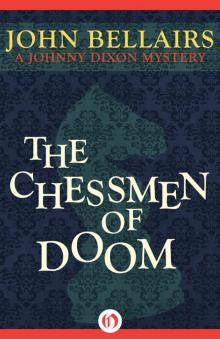 Chessmen of Doom
Chessmen of Doom Secret of the Underground Room
Secret of the Underground Room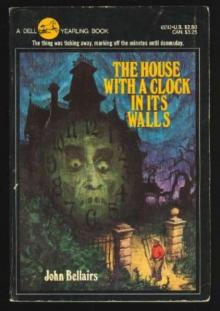 The House With a Clock in Its Walls
The House With a Clock in Its Walls The Vengeance of the Witch-Finder
The Vengeance of the Witch-Finder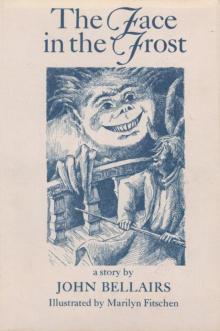 The Face in the Frost
The Face in the Frost Revenge of the Wizard's Ghost
Revenge of the Wizard's Ghost Spell of the Sorcerer's Skull
Spell of the Sorcerer's Skull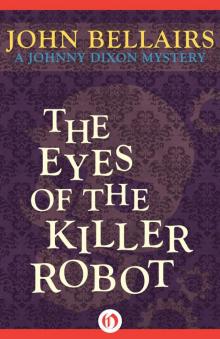 Eyes of the Killer Robot
Eyes of the Killer Robot Mummy, the Will, and the Crypt
Mummy, the Will, and the Crypt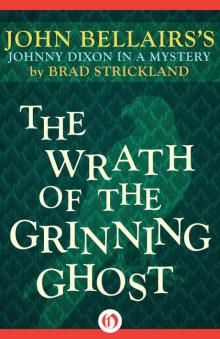 Wrath of the Grinning Ghost
Wrath of the Grinning Ghost The Mansion in the Mist
The Mansion in the Mist The Doom of the Haunted Opera
The Doom of the Haunted Opera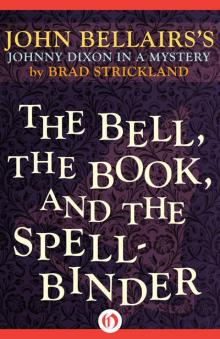 The Bell, the Book, and the Spellbinder
The Bell, the Book, and the Spellbinder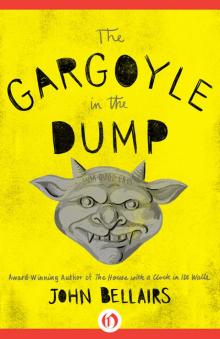 The Gargoyle in the Dump
The Gargoyle in the Dump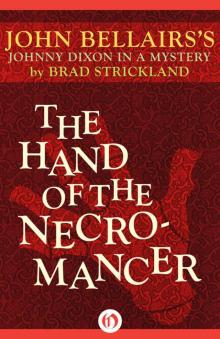 The Hand of the Necromancer
The Hand of the Necromancer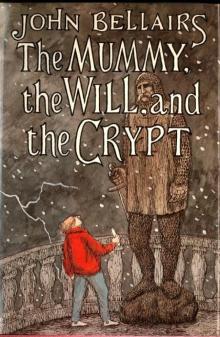 The Mummy, the Will, and the Crypt
The Mummy, the Will, and the Crypt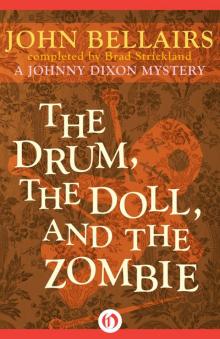 Drum, the Doll, and the Zombie
Drum, the Doll, and the Zombie The Specter from the Magician's Museum
The Specter from the Magician's Museum The Letter, the Witch, and the Ring
The Letter, the Witch, and the Ring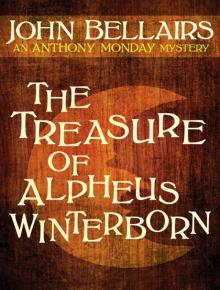 The Treasure of Alpheus Winterborn
The Treasure of Alpheus Winterborn The Dark Secret of Weatherend
The Dark Secret of Weatherend The Figure in the Shadows
The Figure in the Shadows